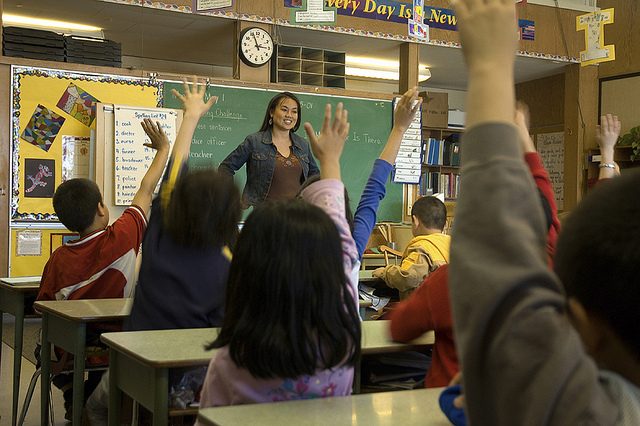Please support our coverage of democratic movements and become a monthly supporter of rabble.ca.
We have a rip-roaring debate going in Nova Scotia over our poor showing in literacy and math in the public schools, as we should. That, however, is only the tip of the iceberg.
The bigger chunk is the huge cost of delivering these inadequate results. Education is typically the second biggest item in provincial budgets, after health, and is in growing turmoil everywhere over both results and cost — a teachers’ strike in B.C., uproar in Alberta over a plan to evaluate and re-certify teachers every five years and Round 2 in Ontario as teachers gear up to fight back over a salary freeze and rollbacks by the former McGuinty government.
In the U.S., it’s even more turbulent, as many cash-strapped states, led by hard right-wing politicians, have been stripping teachers’ unions of bargaining rights and crunching pensions and salaries. In California, a group of students — students, no less — challenged teacher seniority rules in court, and won, arguing that the inability to fire dysfunctional teachers meant students were being shortchanged on their education. The challenge is expected to spread to other states.
The tsunami is not quite here yet. But it’s coming, so what are we doing to prepare?
As it turns out, the issue was engaged by the former NDP government, but is being shut down by the present one.
The crux of it is as follows.
The NDP looked at some figures and winced, as should we. The student population is dropping by nearly 3,000 a year — down over 30,000 in the last ten years or so, the equivalent of 30 large high schools. Yet education spending is up by over 40 per cent in that time. Think about it.
The NDP started cutting back on school board budgets. This was politically unpopular. It ceased in its last budget before the election. But the new Liberal government has gone into full throttle, pumping $65 million more over four years. Meanwhile, its rationale is to have an online public consultation which will, according to the writeup, lead to research into the “high-priority concerns identified by Nova Scotians to better understand the issues and recommend action.”
This is just kicking the ball down the road. Whatever good comes out of it, the big question won’t be asked or answered: How come spending is ballooning while the clientele is shrinking dramatically? I’d say we need answers before spending goes up any more.
Along with things like management of school bus fleets, inefficiencies in new school construction (or whether they’re needed at all), let suspicion fall on things like teacher upgrades, in which teachers take courses at public expense then get a salary top-up when it’s completed.
These heaved into view recently when it was found that video courses from Drake University in the U.S. were not up to snuff. On the feeble footing that the paperwork had already been done, Education Minister Karen Casey decreed that the teachers who applied could go ahead with the course anyway, although they might be useless. With costs and salary top-ups, this could end up costing more than $50 million, according to expert number-cruncher and fellow columnist Bill Black.
But what about the rest of them — how many actually add value to education or are even related to it? And what do they cost? I’ve had my suspicions since my wife, who worked as a library tech in the HRM school system until a dozen years ago, reported one day that a teacher six months from retirement had been sent off to a course in Florida. Do we have a perk system out of control here?
Then there’s my other long-term suspicion: that when the Nova Scotia Teachers’ Union negotiates its contracts, and usually gets what it wants, it’s basically negotiating with itself. The NSTU plus the school boards and the Department of Education look like one and the same soggy bureaucratic wad.
When the crunch really comes — and we’re not without our stresses here now, with fights over school boundaries and closures, new teachers paying disproportionately to keep old teachers’ pensions topped up, and so on — the word elsewhere is that in future the only arguments that will wash with the public will be those that can convince it that whatever is being proposed is for the good of students and education outcomes. This will be tough for teachers’ unions, whose mandate is specifically to advance their members’ interests, not students’.
And for governments, as the pressure mounts, pumping money back in with some vague online plan in the making won’t cut it either. The McNeil government has made tightening up the bureaucracy the centrepiece of its health policy. No such thing in education where, if nothing is done, trouble will merely rise. Clearly we need a rip-roaring debate, not only into teaching methods but into why the whole system is not only seen to be misfiring but costing a fortune doing it.
Ralph Surette is a freelance journalist in Yarmouth County. This article was first published in the Chronicle Herald.
Photo: flickr/Teacher In Classroom



